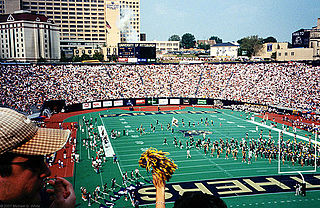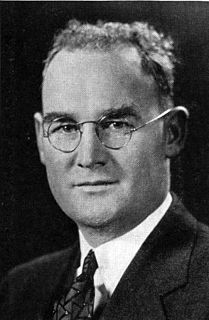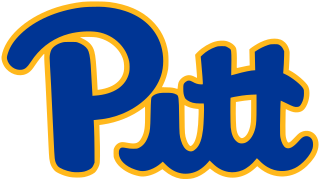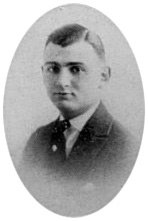
Pitt Stadium was an outdoor athletic stadium in the eastern United States, located on the campus of the University of Pittsburgh in the Oakland neighborhood of Pittsburgh, Pennsylvania. Opened in 1925, it served primarily as the home of the university's Pittsburgh Panthers football team through 1999. It was also used for other sporting events, including basketball, soccer, baseball, track and field, rifle, and gymnastics.
In several countries’ sports, a fight song is a song associated with a team. In both professional and amateur sports, fight songs are a popular way for fans to cheer for their team, and are also laden with history; in singing a fight song, fans feel part of a large, time-honored tradition. Although the term "fight song" is primarily used in the United States and Canada the use of fight songs is commonplace around the world, but they may also be referred to as team anthems, team songs or games songs in other countries, including Australia, Mexico and New Zealand. Fight songs differ from stadium anthems, used for similar purposes, in that they are usually written specifically for the purposes of the team, whereas stadium anthems are not. In Australian Rules Football it is tradition for the song to be sung by the winning team at the end of the game.

Henry Clifford "Doc" Carlson was an American basketball coach and football player. He is a Naismith Basketball Hall of Fame inductee as the men's college basketball coach of his alma mater, the University of Pittsburgh, from 1922 to 1953. At Pitt he compiled a record of 367–247 record (.595). His 1927–28 team finished the season with a 21–0 record and was retroactively named the national champion by the Helms Athletic Foundation and the Premo-Porretta Power Poll; Carlson's Panthers would receive retroactive recognition as the Helms national champion for the 1929–30 season as well. Carlson also led Pitt to the Final Four in 1941. As a student at the university, Carlson was also a First Team All-American end on Pitt's football team under coach "Pop" Warner. Carlson also lettered in basketball and baseball.

The Backyard Brawl is an American college football rivalry between the University of Pittsburgh Panthers and the West Virginia University Mountaineers. The term "Backyard Brawl" has also been used to refer to college basketball games played annually or semi-annually and may also be used to refer to other athletic competitions between the two schools. It is a registered trademark for both universities, and refers to the close proximity of the two universities, separated by 75 miles (105 km) along Interstate 79.
The University of Alabama is a school with many traditions. This article describes several of these traditions.

The Pittsburgh Panthers, commonly also referred to as the Pitt Panthers, are the athletic teams representing the University of Pittsburgh, although the term is colloquially used to refer to other aspects of the university such as alumni, faculty, and students. Pitt fields 19 university-sponsored varsity teams at the highest level of competitive collegiate athletics in the United States: the NCAA Division I Football Bowl Subdivision (FBS) for American football.

The Ateneo Blue Eagles are the collegiate men's varsity teams of the Ateneo de Manila University that play in the University Athletic Association of the Philippines (UAAP), the premiere collegiate league in the Philippines. The collegiate women's varsity basketball team is called the Lady Eagles. The Ateneo collegiate men's varsity basketball team was not always called the Blue Eagles. It got the name Blue Eagles when Ateneo adopted the Eagle as its mascot in 1938. Prior to that, from 1914 it was known under different names. Ateneo has fifteen collegiate men's varsity teams that participate in fifteen sporting events of the University Athletic Association of the Philippines, its mother league. Twenty five years after playing their last game as Blue Eagles, the Board of Directors of the Ateneo Sports Hall of Fame review their playing years as Blue Eagles. Those who meet the criteria are inducted into the Ateneo Sports Hall of Fame.

The Pittsburgh Panthers football program is the intercollegiate football team of the University of Pittsburgh, often referred to as "Pitt", in Pittsburgh, Pennsylvania. Traditionally the most popular sport at the university, Pitt football has played at the highest level of American college football competition, now termed the NCAA Division I Football Bowl Subdivision, since the beginning of the school's official sponsorship of the sport in 1890. Pitt competes as a member of the Atlantic Coast Conference (ACC).
The University of Pittsburgh Varsity Marching Band, or Pitt Band, is the college marching band at the University of Pittsburgh. The band numbers over 300 students consisting of instrumentalists, a majorette squad known as the Golden Girls, a color guard, and the drumline. The band was founded in 1911 and has won numerous awards over the years. All members of the band must pass an audition in order to join. The band is currently housed in Trees Hall; however, in 2020, the Pitt Athletic Department announced its "Victory Heights" initiative, part of the campus master plan which includes a new marching band facility slated to open in 2024.

A panther is the animal that serves as the official mascot of the University of Pittsburgh and used as a nickname for both athletic teams as well as other organizations and affiliates of the university. The mascot is generally referred to as the Pittsburgh Panther or Pitt Panther, while the costumed panther mascot is also named "Roc". Up to 20 physical representations of panthers can be found in and around the university's campus and athletic facilities.
"The Good Old Song" is the de facto school song of the University of Virginia. It is often said to be the university's fight song, although the actual fight song is "The Cavalier Song". It is set to the music of "Auld Lang Syne", a song frequently sung on New Year's Eve.

The Thunder of the East is the marching band of the University at Buffalo in the State University of New York system. UB's first marching band was created in 1920, and disbanded in 1927. It was revived in 1946, increasing in size and reputation until about 1970. It was known as "The Pride of the East." At that time, it was dissolved upon UB's departure from Division I athletics. In 1981, some UB students continued the tradition of playing music at UB's home football and basketball games by forming UB's Pep Band. In anticipation of UB's return to Division I athletics, a marching band was formed in 1999 and named, "Thunder of the East." The band debuted at the University at Buffalo Stadium on September 11, 1999. The Thunder of the East is currently led by James E. Mauck; and performs at UB's Buffalo Bulls home football games, as well as in other musical venues.

The Oakland Zoo is the student cheering section for the University of Pittsburgh men's and women's basketball teams. The Zoo cheers on the Panthers from the bottom tier of the stands at the Petersen Events Center, primarily across from the teams' benches and on the baselines under the baskets. The "Pete" holds a rowdy crowd of 1,500 students that are typically uniformly clad in gold t-shirts, and the Zoo student section is consistently sold out for Panthers home games. The Oakland Zoo is named after Oakland, the neighborhood in which the university is located. The name "Oakland Zoo" is used for the basketball cheering sections only; the football cheering section has often used the title, "The Panther Pitt."

Joseph "Colonel Joe" Henry Thompson was a highly decorated World War I veteran, recipient of the Medal of Honor, lawyer, Pennsylvania state senator, head football coach of the University of Pittsburgh Panthers, and College Football Hall of Fame inductee.

"Hail to Pitt" is the most traditional fight song of the University of Pittsburgh, which is commonly referred to as Pitt. The saying "Hail to Pitt!" is also the most traditional and commonly used slogan of the University of Pittsburgh and its athletics teams. The slogan is frequently used in promotional material, printed on merchandise and souvenirs. It was also the title of a 1982 history of Pitt athletics by author Jim O'Brien. The slogan is often used among alumni as a statement of affiliation, including as a closing signature in conversation or correspondence between alumni, and is sometime abbreviated as "HTP" or "H2P", the latter of which is a registered trademark of the university and is frequently used on official university signage and merchandise.

The alma mater of the University of Pittsburgh was adopted soon after the University changed its name in 1908 from the Western University of Pennsylvania to its current moniker. Lyrics were written by George M. P. Baird, class of 1909 and were set to the tune of what was then the Austrian National Anthem. A new tune for the "Alma Mater" hymn was composed by Charles W. Scovel, class of 1883, but it was not widely adopted and was either lost or became obscure.

"The Orange and Blue" is the traditional fight song of the Florida Gators intercollegiate sports teams of the University of Florida in Gainesville, Florida.

The 1976 Pittsburgh Panthers football team represented the University of Pittsburgh in the 1976 NCAA Division I football season and is recognized as a consensus national champion. Pitt was also awarded the Lambert-Meadowlands Trophy as the best Division I team in the East.
American football in Western Pennsylvania, featuring the city of Pittsburgh and surrounding areas, has had a long and storied history, dating back to the early days of the sport. All levels of football, including high school football and college football, are followed passionately, and the area's National Football League (NFL) team, the Pittsburgh Steelers, is consistently one of the sport's most popular teams. Many of the NFL's top stars have come from the region as well, especially those that play quarterback, earning Western Pennsylvania the nickname "Cradle of Quarterbacks".
"Varsity" is a fight song of the University of Michigan.














